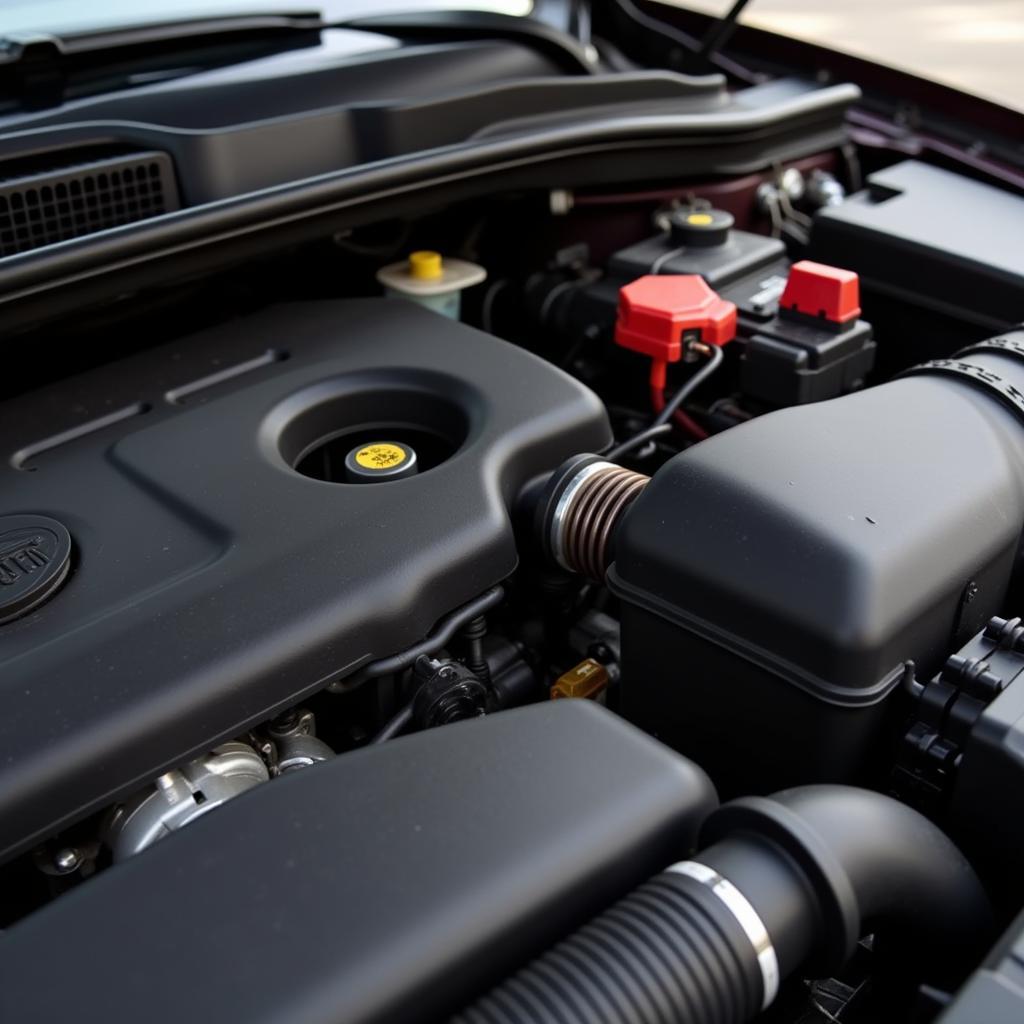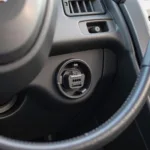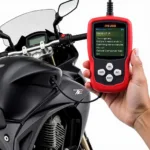The P0325 OBD2 code, indicating a problem with your vehicle’s knock sensor circuit, can be a cause for concern. This code, often accompanied by noticeable engine performance issues, signals a disruption in your car’s ability to optimize fuel combustion and prevent engine damage. This article delves into the intricacies of the P0325 code, empowering you to understand its implications, diagnose the root cause, and take appropriate action.
What Does the P0325 Code Mean?
At its core, the P0325 code signifies a problem within the knock sensor 1 circuit, typically found on Bank 1 of your engine (where cylinder #1 is located). The knock sensor plays a crucial role in maintaining your engine’s health and performance. It acts as the engine’s “ear,” listening for the telltale signs of engine knock – a sharp, pinging sound caused by premature detonation of the air/fuel mixture.
When the knock sensor detects this harmful detonation, it sends a signal to the Engine Control Unit (ECU), the brain of your vehicle. The ECU then adjusts the ignition timing to prevent further knocking and protect your engine from potential damage.
Symptoms of a P0325 Code
While the Check Engine Light illuminating on your dashboard is a clear indicator, other symptoms might surface alongside a P0325 code, signaling a potential problem with your knock sensor circuit:
- Engine Knocking: The most obvious symptom, engine knocking or pinging, is a distinct metallic sound, particularly noticeable during acceleration or under heavy load.
- Decreased Engine Performance: A faulty knock sensor can lead to reduced engine power, sluggish acceleration, and overall poor performance.
- Poor Fuel Economy: As the ECU might retard ignition timing to compensate for potential knocking, your fuel economy may suffer.
- Hesitation or Stalling: In some cases, the engine might hesitate or even stall due to improper ignition timing caused by a malfunctioning knock sensor circuit.
Common Causes of a P0325 Code
Several culprits can trigger a P0325 code, ranging from simple issues to more complex problems requiring professional attention:
- Faulty Knock Sensor: The most common cause, a malfunctioning knock sensor itself, might fail due to age, wear and tear, or exposure to extreme temperatures.
- Wiring Issues: Damaged, corroded, or loose wiring in the knock sensor circuit can disrupt communication between the sensor and the ECU.
- Faulty ECU: While less common, a malfunctioning ECU can misinterpret signals from the knock sensor, leading to a P0325 code.
- Low Octane Fuel: Using fuel with a lower octane rating than recommended by your vehicle manufacturer can contribute to engine knocking and trigger the code.
How to Diagnose a P0325 Code
Diagnosing a P0325 code requires a systematic approach to pinpoint the root cause. Here’s a step-by-step guide:
- Read the Code: Use an OBD2 scanner to retrieve the stored trouble codes. Note down all the codes present, as multiple codes can provide further insight into the issue.
- Inspect the Knock Sensor: Locate the knock sensor (refer to your vehicle’s repair manual) and visually inspect it for any signs of damage, corrosion, or loose connections.
- Check the Wiring: Thoroughly examine the wiring harness connected to the knock sensor for any fraying, breaks, or loose connections.
- Test the Sensor: Use a digital multimeter to test the knock sensor’s resistance and voltage, comparing the readings to the manufacturer’s specifications.
- Inspect the ECU: If the knock sensor and wiring appear to be in good condition, have a qualified mechanic inspect the ECU for any faults.
Can You Drive with a P0325 Code?
While driving short distances with a P0325 code might seem harmless, it’s not recommended. Ignoring the problem can lead to more severe engine damage and costly repairs in the long run. A malfunctioning knock sensor circuit prevents your engine from safeguarding itself against harmful detonation, putting it at risk.
Fixing a P0325 Code
The solution to a P0325 code depends entirely on the underlying cause. Here are some common fixes:
- Replace the Knock Sensor: If diagnosed as faulty, replacing the knock sensor is often the most straightforward solution.
- Repair Wiring Issues: Any damaged, corroded, or loose wiring in the knock sensor circuit needs to be repaired or replaced to restore proper communication.
- Reflash or Replace the ECU: In rare cases, reflashing or replacing the ECU might be necessary to resolve the issue, often requiring professional intervention.
- Use the Correct Fuel: Ensure you’re using fuel with the octane rating recommended in your vehicle’s owner’s manual to prevent engine knocking.
Preventing P0325 Codes in the Future
While not all P0325 codes are preventable, taking a few proactive steps can significantly reduce the risk:
- Regular Maintenance: Adhering to your vehicle’s recommended maintenance schedule, including spark plug replacements and fuel system cleaning, can help prevent issues that trigger knock sensor codes.
- Quality Fuel: Always use high-quality fuel with the correct octane rating for your vehicle.
- Gentle Driving: Avoiding aggressive driving habits, especially rapid acceleration, can minimize the likelihood of engine knocking.
Conclusion
Understanding the P0325 OBD2 code and its implications is crucial for maintaining your vehicle’s health and longevity. By recognizing the symptoms, understanding the common causes, and taking the necessary steps for diagnosis and repair, you can ensure your engine remains protected and performs at its best. Remember, addressing the issue promptly can save you from potentially costly repairs down the road.
FAQs (Frequently Asked Questions)
1. Can a bad knock sensor cause engine damage?
Yes, a faulty knock sensor can lead to severe engine damage over time.
2. How much does it cost to replace a knock sensor?
The cost can vary depending on the make and model of your vehicle, but generally ranges from $150 to $400.
3. Can I replace the knock sensor myself?
While it’s possible, replacing a knock sensor often requires some mechanical knowledge and the right tools.
4. How long can I drive with a P0325 code?
It’s not recommended to drive with a P0325 code as it can lead to further engine damage.
5. Can a loose gas cap trigger a P0325 code?
No, a loose gas cap typically triggers an emissions-related code, not a knock sensor code.
Need more help with your car troubles? Check out our other resources:
Still have questions? We’re here to assist!
Contact our expert team via WhatsApp: +1(641)206-8880 or Email: [email protected] for 24/7 support.


